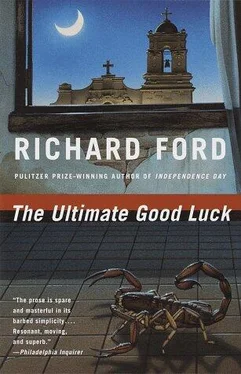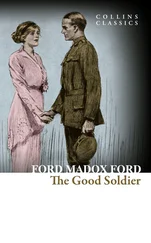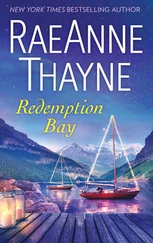But it had all given rise to a feeling he had never had before, even late in the war, down to days, a conspicuous undisciplined fear of enormous injury. A peacetime fear. Sitting out nights in the frozen basswoods below Elk Lake, listening for trolling motors easing down into the shallows of the Rapid River, sinking steelhead weirs between the first narrow sand shoals, he would suddenly sense something nearby, something that would hit him and blow him to pieces, and he’d pitch sideways in the Scout to miss whatever it was, though there was nothing. Delivery boys backing a TV out of an appliance-store door would make him scrounge up high in his stomach, ready to receive a killing blow. And at night in the trailer, barely asleep, there’d be the same galvanizing shock that threw him up in bed shuddering from the instinct that he’d almost been hit by something falling, though there was nothing to hit him, and no one in the trailer but him, and his pistol beside the bed. And every time he had the fear, he’d picture in his mind not the junkie who’d cut him on Kenwood Avenue, which he thought was the cause of it, but the snowman in the train yards in South Bend, standing erect and by himself, smiling out at some disaster rising up on the horizon.
He thought now, though, watching the lights beginning to prickle out across the valley and beyond the mountain rim like greying stars, that the threat of death in that instance was only the dark side of something else, something he needed — Rae, maybe — and would have to live with unexplained until he got it, or until he stopped wanting it anymore, and at the same time stopped wanting everything else too, which was just a disaster of a different order.
He began to smell the dense fragrance of other places, the evening coming slowly on the city, the pale nimbus of town light rising into the ash sky. Doves had settled into the eucalyptus branches, and he could hear a bus crawling up the Reforma Hill into the twilight. The music truck was gone and a sweet dirt and cinnamon odor shifted and wandered up through the evening atmosphere. It was the smell of town streets, emptied for the night except for the fruit stands and tortillerías out the Avenue Garcia Vigil.
Rae stood at the glass door, her hair thick and wet against her neck, her skin roughed and pink in the nearly gone light. He smelled her now, the sour streaminess of the bathroom and the sweet oil she used. She seemed taller than he remembered.
“Are we in the tropics now?” She pressed her hair between the folds of her towel, but he didn’t watch her.
“The Torrid Zone,” he said.
“It just feels out of date, to me.” She let her head come to the side, letting her hair fall. “When I was in the shower I tried to think of one act of kindness between Sonny and me, you know, just something little. And I could only think of one.”
He looked at her in the doorway, framed by the table lamp she had turned on behind her. Her breasts were full only to the sides of her rib cage, her head tilted against the doorjamb. Her body had a generosity that making love didn’t have anything to do with.
“One might be a lot,” he said.
Her face became composed. “One time, you know, when we were living in Bay Shore before my father decided to be an artist, Sonny was trying to hit a golf ball into South Bay, and I was standing too close behind him, and he turned around and said, ‘Get out of the way, Rae.’ And that was all. He thought he was a golfer. Isn’t that pitiful?”
He could feel the air slide past his face into the open doorway. It reminded him of something from when he was a boy, something out of the lake after dark, but he couldn’t think exactly what it was now. Something he’d liked, but lost. “You know what I’d like?” he said.
“Not to talk about Sonny,” she said.
“That’d be all right,” he said. “But I’d like it if you stayed a little longer than tomorrow.”
She stepped across the flat stones close to him, the towel around her breasts. He smelled her skin in the air, felt the whorl of hair in the channel of her back. All the veins were blue under her skin. “Aren’t you afraid?” she said.
“It doesn’t matter,” he said. He heard the clock strike seven in the zócalo and again elsewhere in town, seconds later. A dog began barking in the rich cabañas below the bungalow, a sound like a turkey’s cluck, fast and frequent and disappointed.
“We make love at odd times, you know,” she said softly, coming nearer. “Late in the day’s such an odd time.”
BERNHARDT WAS IMMERSED in driving the streets, as though he wanted to avoid something unpleasant. Quinn had left Rae in the Portal watching the Indian musicians preparing to play again in the kiosk. The Centro was crowded with evening tourists, and all the Christmas decorations had been turned on. He had ordered her a beer, and she said she could stand it an hour alone.
Bernhardt was still wearing the beige suit. He drove out toward the Avenue of the Niños of Chapultepec, which divided the middle-class from the poor districts, then switched back toward the airport highway. There were soldiers in the dark streets, patrolling specified houses, teenagers in camouflaged helmets sporting big M-16s. They looked condensed and undernourished in the shadow lights, like true guerrillas, their faces identical and obscure.
Bernhardt merged out onto the peripheral boulevard at the boundary of the slum barrios, into a district where the town buses turned back toward the Centro. There was little traffic, and the helium lamps gauzed the air and made it hang in the night. Bernhardt didn’t speak. He drove a mile on the periférico, past the airport turnoff, then took a road that crossed the Atoyac and the train line from Mexico City, and went into the palms where there was suddenly no light, and the road became laterite. They were close to where the men beside the Pepsi truck had disappeared into the riverbed, and Bernhardt had begun to drive faster.
“Does it matter if you hit somebody?” Quinn said.
Bernhardt shook his head. He watched the road attentively as it narrowed into the dense palms. “The law makes more trouble than the good you do to stop. If no one is caught the death is bad fate. But when the law takes you, it wants to determine why things. Why do you do this? Why you do that? And if you don’t mean to, there’s no why, and they never let you go. But the man is still dead.” Bernhardt elevated his chin in affection for his explanation.
“Where’s this going?” He thought about Rae in the Centro. It was making him edgy to be away.
“It will take only a few minutes.” Bernhardt flicked up the brights, and Quinn could see up the long corridor of palm trunks diminishing quickly into a hole of darkness. It felt like a picture from a dream in which events never completely conclude.
“Do you fear becoming old?” Bernhardt asked expansively, keeping his eyes on the road.
“I fear not becoming old a lot more,” Quinn said.
“How many years are you?”
“Just thirty-one,” Quinn said.
Bernhardt smiled. The dash light made the frames of his glasses shine. “For you, though, love is a place where you don’t grow old. Is that right?”
“Sure thing. You put your finger right on it.” He had a feeling he’d see Deats tonight, but he couldn’t guess why. Bernhardt was trying to keep his mind occupied.
“I do fear it,” Bernhardt said emphatically. He kept his chin high. “I am forty, a young man. But I consider sometimes suicide. It is only fear of being old, do you agree?”
“I go the other way,” Quinn said. “At least I hope I do.”
“You were in the war,” Bernhardt said. “You don’t think of suicide now.”
Читать дальше







![Theresa Cheung - The Dream Dictionary from A to Z [Revised edition] - The Ultimate A–Z to Interpret the Secrets of Your Dreams](/books/692092/theresa-cheung-the-dream-dictionary-from-a-to-z-r-thumb.webp)




